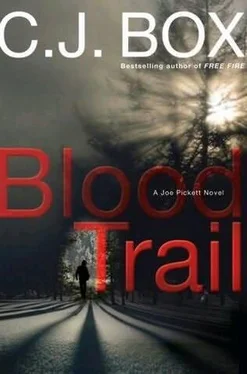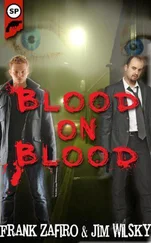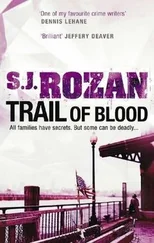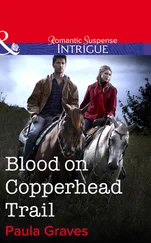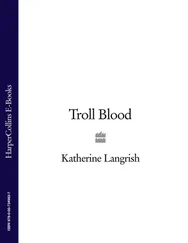Pope nodded his head the whole time the governor was speaking, warming to the idea.
“Form a ready-response team,” Rulon said. “I want you all on it except for Kiner. Work with Lothar, give him whatever he needs and wants. Maybe he can find our shooter.”
“That’s a great idea,” Pope said. “We can use some help.”
“And if he can’t find anything,” Rulon said, “we’ll keep him on retainer and you keep your team together until the next hunter goes down.”
“The next hunter?” Robey said.
“I’m sure there will be another,” Rulon said sourly, “that is, if there are any hunters left in Wyoming after Klamath Moore’s press conference tomorrow.”
This time, Pope moaned.
“Lothar’s expensive,” Rulon said, “but you can afford his fee.”
“This is coming out of my budget?” Pope said, his voice rising.
“Yes, it is. The legislature is auditing my discretionary fund and I don’t want this on it. Think of it as an investment in the future health and welfare of your agency.”
“But-”
“No buts. Now, I’ve got to be going, gentlemen. My chief of staff is signaling me. We’ve got some Chinese delegation in the next room wanting to buy wheat or oil or something. I’ve got to go. So get this done and send Klamath Moore back home as soon as you can.”
Rulon started to push away from his desk.
“Governor?” Joe said.
“Yes, Joe.”
“Sir, I have no doubt that what you say about Buck Lothar is true. I’ve heard about him. But there’s someone else who is as good or better, and who knows this country.”
Rulon quickly said, “Joe, we can’t go there.”
“Nate Romanowski is in federal custody,” Joe said. “You could work a deal to get him out. We could use him.”
Pope blanched, and Robey said, “Joe…”
“Not an option,” Rulon said. “Forget it.”
“We might need him,” Joe said.
“If Lothar can’t get it done,” Rulon said, “we’ll talk. But for now the other option is off the table. Good night, gentlemen.”
With that, the screen went black. Before it did, Joe saw Stella’s hand with dark-red-painted nails gesture to the governor to follow her. Follow her where? Joe thought.
IN THE HALLWAY, Joe asked Pope if he could take the files home with him to read that night.
“I’d like a copy too,” Robey said.
Reluctantly, Pope handed them over. “I’ll wait here while you make copies,” he said. “But I don’t need to tell you how important it is we don’t say anything about the fact that we may have a serial killer going after hunters. We aren’t sure yet it’s the case, and that kind of speculation would kill us as an agency.”
“Got it,” Joe said, “although with Klamath Moore’s press conference tomorrow, it won’t be a secret anymore.”
Pope winced as if he had a painful tooth.
JOE LEANED against the wall while Robey ran the pages through the machine and the light from the copier strobed the walls.
Kiner had left the meeting with his head down and refused to acknowledge Joe’s good-bye.
“What did Kiner do to piss off the governor?” Robey asked.
“He supported the governor’s opponent in the last election,” Joe said.
“Rulon holds a grudge,” Robey said, nodding. “Did you come out for Rulon at the time?”
“No. But I didn’t make a point of it, like Phil did.”
“Interesting,” Robey said. “And what in the hell is going on with Pope? He’s had a complete change of heart when it comes to you. I know for a fact for the last two years he’s had it in for you, even calling my office to see if he could get any dirt on you.”
Joe shrugged.
“Maybe he really does need you this time.”
“Maybe.”
“But you’re not sure.”
“There’s always something going on with that guy. He’s the best and meanest bureaucrat I’ve ever been around. He should give seminars.”
Robey smiled.
Joe fingered the poker chip in the plastic bag. “I don’t remember anyone saying they were playing poker. Besides, Frank Urman’s clothes were up on the hill in a pile. They were cut off him before he was hung and skinned. I don’t see how the poker chip could have just been there, do you?”
Robey shrugged. “Pope shut you down pretty fast.”
“I wonder why,” Joe said.
“Are you thinking the killer left it as a calling card?”
“Maybe,” Joe said.
Robey handed Joe his set of files. “Call me when you’ve read these and let’s see if we can figure anything out.”
“I might be up late,” Joe said. “I’m having trouble getting the image of Frank Urman’s body out of my head.”
“Don’t worry, I’ll be up,” Robey said.
OUT OF HABIT, Joe started home in the direction of Bighorn Road before turning around, remembering he now lived in town.
SIXTEEN-YEAR-OLD SHERIDAN PICKETT was at her desk in her upstairs room under the pretense of doing homework, which she’d actually completed an hour before. The door was shut, meaning she didn’t want to be disturbed. Which, of course, meant nothing to her younger sister, Lucy, who opened it and stuck her head in. “I need to use the computer.”
Sheridan quickly hid what she was doing. “Can’t you see I’m busy?”
Unfortunately, Lucy could see the computer screen from the doorway and the three IM conversations Sheridan had going.
“I’ve got homework too,” Lucy said. “You’ve been in here for two hours and I need the computer. Do you want me to tell Mom you won’t let me use it? What are you doing, anyway?”
“I said I was busy. Do I need to start locking my door?”
“You do that and Mom and Dad will move the computer to the living room.”
Sheridan mumbled a curse under her breath because her sister was right.
“Give me ten minutes,” Sheridan said.
“Five.”
“Ten!”
“I’ll be back.”
Sheridan sighed and uncovered her project. She was writing a letter. A letter! Until recently, she’d never written one and rarely received them. With text messaging, IM, and e-mail, letters, she thought, actual letters that were folded and placed in envelopes with a stamp on them were a thing of the past, like phones with dials. She didn’t even know where to buy stamps until a few months ago. The little booklet of stamps she purchased was hidden in her purse, and the envelopes and stationery were folded into her dictionary, a gift from Grandmother Missy that she never used because she had SpellCheck. But she’d found out the only way to communicate with her mentor was by sending a letter.
THE LAST few months had been tumultuous. In addition to starting her sophomore year at Saddlestring High, her family had moved from her grandmother’s ranch into town. Since Sheridan had grown up isolated from neighbors and traffic, she found the new situation both liberating-her friends were a bike ride away and after all these years she no longer needed to ride the bus to and from school-and stifling. Everyone was so close to everybody else. She no longer saw the mule deer as they floated in the half-dark to the river to drink, or the elk that fed in the shorn hay meadows. It took a month to get used to the sounds outside the house at night-cars racing up the street, dogs barking, sirens. She wasn’t sure she liked it.
Her mother’s company, MBP Management, continued to do well, even though her mom rarely talked about it like she used to. Since her mom had decided to trim back her hours and turn over more of the workload to her employees, she was able to be home more. Which was good, since her dad was gone so much on special assignments around the state. He called every night, though, except when he was in remote areas without telephones or cell service. Several of her mom’s new client businesses were start-ups on the reservation that bordered Twelve Sleep County and was occupied by Northern Arapaho and Eastern Shoshone. The proximity of the new businesses made it easier for her mom to stay close to home. In fact, Sheridan thought, after so many years out on Bighorn Road or on the ranch, their lives were achingly, numbingly dull. When she mentioned this to her mother, Marybeth smiled and said, “Dull is good, sweetie. Dull is good.”
Читать дальше
